7 Ways to Measure or Calculate Your Body Fat Percentage (And Lower It!)
Today we are going to teach you everything you’ve ever wanted to know about body fat percentage but were too afraid to ask.
Plus, I’m gonna drop some sick Kanye references and share cute animal gifs to keep you reading. Trust me, they’re really cute.
In this Body Fat Measurement Guide, we’ll cover:
- What is body fat percentage?
- What are some examples of body fat percentage?
- What should my body fat percentage be?
- How do I calculate or measure my body fat percentage?
- What’s the best way to lower body fat percentage?
- Is BMI the same as body fat percentage?
If you have been struggling with your weight (and having too high of a body fat percentage) for a while, I know how frustrating that can be.
As Kanye famously declared, “that right there could drive a sane man berserk.”
It’s disheartening to repeatedly make some progress only to slide back again.
It’s why we built our popular 1-on-1 Online Coaching program, so this time things can be different. Your NF Coach will help you track the right metrics (like body fat percentage) and set the right goals.
They’ll provide you with a custom workout program and nutritional guidance to help you reach those goals too. It’s accountability in your pocket.
Find out if coaching is right for you by clicking on the image below:
Fair warning: lots of half-naked people of all different levels of body fat in this article!
What is body fat percentage?
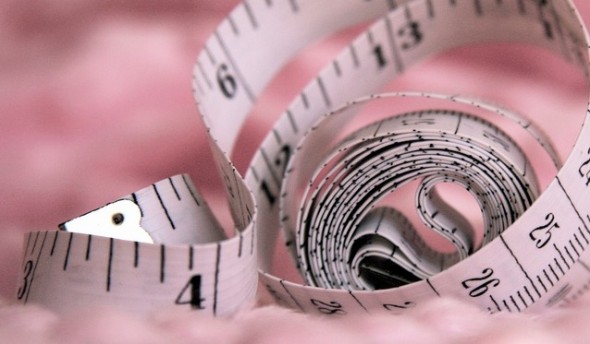
In its simplest form: body fat is the amount of fat in your body, compared to everything else.
Everything else includes your organs, muscles, bones, tendons, water, and so on.
Both men and women carry different amounts of body fat percentage due to…you know…being different.
A super ripped male bodybuilder who is minimizing body fat percentage could have a percentage down as low as 3-4%, while a super ripped female bodybuilder who is minimizing body fat percentage would only get as low as 8-9%.
A male athlete could be in fantastic shape and have 10% body fat, while a women at a comparable level of athleticism and appearance might be at 18-20% body fat.
To take the comparison to the other end of the spectrum, an overweight male at 30% will look vastly different than an overweight woman at 30%.
Feel free to take a break with this video of a lion cub hanging out with a puppy and a rabbit.
What are some examples of body fat percentage?
Below, you’ll see images of what people look like with different amounts of body fat.
Men:
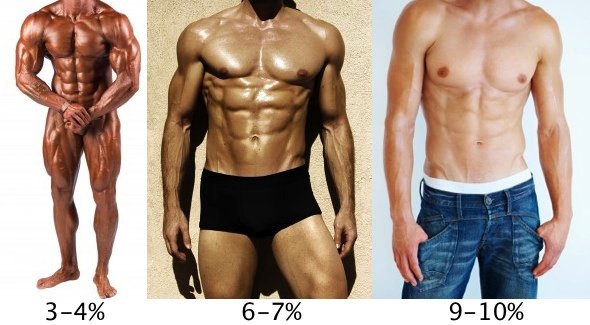
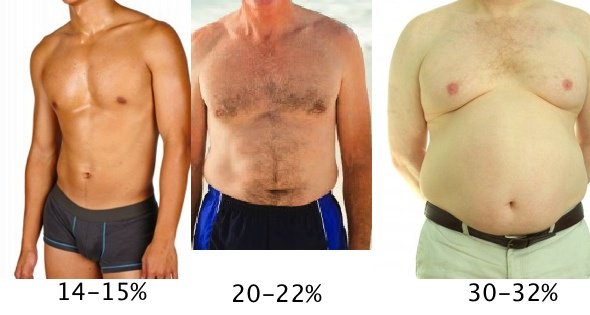
Women:
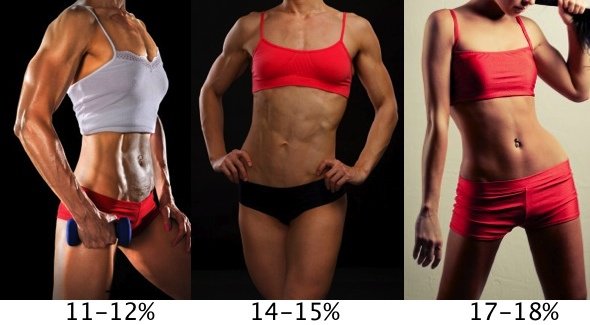
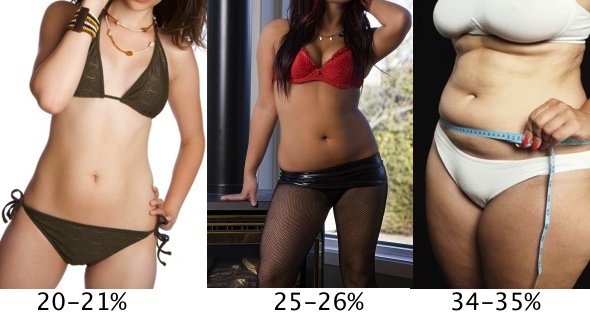
A quick note: your body fat percentage is just the amount of body fat you have; it has nothing to do with the amount of muscle mass you have, which means you can have two people with the same amount of body fat percentage that look WAY different from each other.
Are you surprised about what you thought and what the actual percentages look like?
If so, don’t worry about it – most people have no idea what their body fat percentage is, and will often over or underestimate it pretty dramatically.
We’ll get into what’s a good number to AIM for, and how to measure it next.
After you watch this video of a baby sea otter trying to sleep on mom:
What should my body fat percentage be?
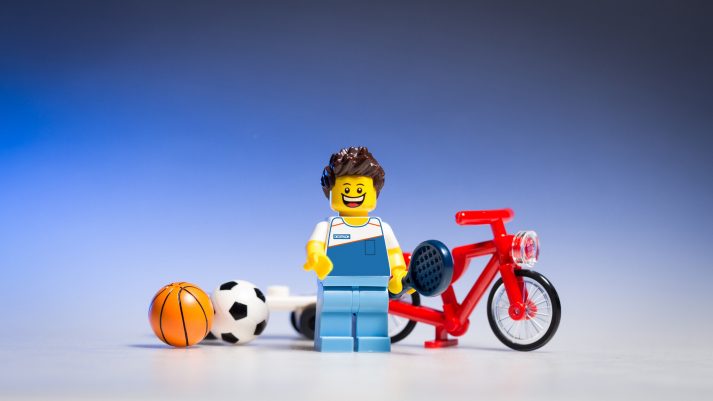
Here is the “generally accepted” chart for women and men when it comes to body fat percentage:
|
Women |
Men |
|
|
Essential fat |
10-12% |
2-4% |
|
Athletes |
14-20% |
6-13% |
|
Fitness |
21-24% |
14-17% |
|
Acceptable |
25-31% |
18-25% |
|
Obese |
32% plus |
26% plus |
In what I’m sure is news to nobody, body fat is essential to survival – fat protects your internal organs, provides you with necessary energy stores in times of peril, and more.
“Essential fat” means the minimal amount of fat required for survival – Anything less than this amount would mostly likely result in organ failure, but even approaching this amount of body fat is dangerous.
It’s for this reason that bodybuilders, who can minimize their body fat to the “essential fat” level only do so when prepping for a show – during the rest of the year they maintain a higher body fat percentage so that they can stay healthy and function properly.
If you are looking to have that “ripped” look (dudes) and “toned” look, you’ll want your body fat percentage to hover in the “athletes” section.
(I cover the philosophy behind this extensively in our “How to build any physique” article.)
If you’re just looking to get healthy and look in the mirror with pride, you can aim for the fitness range. Once you get into the upper ends of “acceptable” and “obese,” a decrease in body fat percentage would benefit your health.
Now, I’m going to GUESS you’re reading this article because you’re interested in reducing your body fat percentage.
For starters, you need to determine what’s an optimal goal for you:
- If you are trying to look like Ryan Reynolds or Jessica Beil in Blade III, good luck! You’ll need to aim for a body fat percentage of 6-8% (men) or 13-15% (women). Note: your athletic/strength gaining performance will most likely suffer at this percentage, and can be really really challenging to maintain. Your call.
- If you are interested in getting that coveted six pack, drop your body fat down to the 8-11% range for dudes and 15-17% range for women.
- If you are an athlete and interested in optimal athletic performance, aim for a body fat percentage around 15% (men) or 20% (women). NF team member Staci trains much better at 20% body fat than at 15% body fat.
- If you are just interested in looking pretty good and feeling pretty good, anything less than 18% for men and anywhere in the 20-23% range for women should get you the “hey, lookin pretty good!” response from your friends.
- Ladies: if you are concerned about menstruation or fertility, it has been said not to drop below 15% body fat. Studies are conflicted on this, your results may vary, but I thought it was worth mentioning!
Hey, you’re still awake!
You’ve unlocked the “cute baby pigmy goat jumping around” video:
How do I calculate or Measure my body fat percentage?
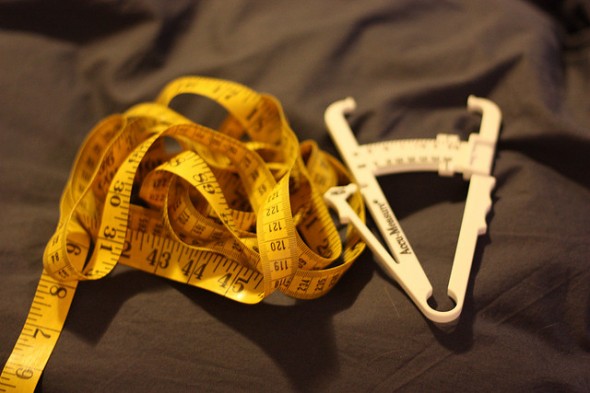
This question I get asked above ALLLLLL others.
There are seven main methods that you can use, each with varying levels of accuracy and cost:
1) Take a Look – This might be my favorite method, although it requires a trained eye and isn’t exact. By having an accurate progression of pictures from week to week and comparing a picture of yourself, you can determine somewhat closely what your body fat percentage is.
Make sure to note the difference in the two men, both at 10% body fat further down the page.
2) Body Fat Calipers – Pick up a set of calipers for $5. Pull the fat away from your muscles, pinch them with the caliper, take the measurements, and look at a chart to figure out your body fat percentage. Some recommend using one test site, some multiple.
In my experience, I have found that these calipers tend to slightly underestimate body fat percentage (mine tell me that i’m 9 or 10% when I’m really 12%, and Staci’s say she’s 17% when she’s more like 20%), but are surprisingly accurate considering how cheap they are.
However, the accuracy isn’t as important as the fact that you pinch and measure the same area, under the same conditions, from week to week. By doing so, you can track overall trends in how the measurement changes to make sure you’re on the right path.
3) The measurement method – By taking measurements (like the US Navy measurement or the YMCA measurement), you can calculate your body fat percentage. I have found, as have others, that this method isn’t incredibly accurate as it can very easily overestimate your body fat.
Considering it only takes a few points of data, this is not surprising.
4) Body fat scales and monitors – An electrical current is sent through your body and uses “biometrical impedance analysis.” I don’t really like this method, as I find the number that it spits out can be horribly inaccurate.
Because they send an electrical current through your body, the amount of water you are carrying can drastically adjust this number too.
5) The Bod Pod – The method calculates your body fat percentage by using air displacement to measure your body mass, volume, and density. This is also pretty darn accurate, but also pretty darn expensive at usually around $75 per session. Find a bod pod location by putting in your location in the right hand column.
6) Water displacement – Although very accurate (within 1-3% percent), it’s expensive, tedious, and a huge pain in the butt. If anybody has any experience with a water displacement test, please share your story in the comments.
7) DEXA Scanning– This is considered the most accurate method, as it actually takes a full dual X-ray of your body composition and gives you numbers. You can get this done at a health facility, and involves you lying on an X-Ray table for about 10 minutes. It’s typically expensive, anywhere from $50-150 per session depending on where you are located.
VERY IMPORTANT: If you are going to start testing your body fat percentage, do whatever you can to test yourself under the same conditions each and every time.
For example: every Monday morning, on an empty stomach, while drinking a single glass of water. This way, even if you’re not getting the correct body fat percentage (due to user error), you’ll at least get a consistent incorrect body fat percentage and can calculate how much you lost or if you are progressing in the right way.
“Steve, just tell me the best method!”
If you have the money, and you have a Bod Pod center close to you, then I’d say this would be the best combination of practicality and accuracy.
If you don’t have the money, then I would go with a simple body fat caliper, along with the “take a look” method of taking weekly photos. Take a photo of yourself each week and compare the photos week to week to see if you can notice more definition in your muscles (which happens when you start to reduce your body fat percentage!).
Here’s the thing with body fat percentage: although it’s fun to know and fun to see it getting lower as you get leaner, methods to track it can often be inaccurate. Take multiple tests with your preferred methods and understand that even then it might be off by 1-3% in either direction. So, track overall TRENDS and go off how you look, and that will get you 95% of the way there.
It comes down to this: Look in the mirror, and compare your progress photos: do you like how you look and are you moving in the right direction? Awesome.
DON’T like what you see?
Follow the advice in the next section.
Another section, another reward. You’ve unlocked the “baby otter attacks a stuffed animal walrus” video:
What’s the best way to lower body fat percentage?
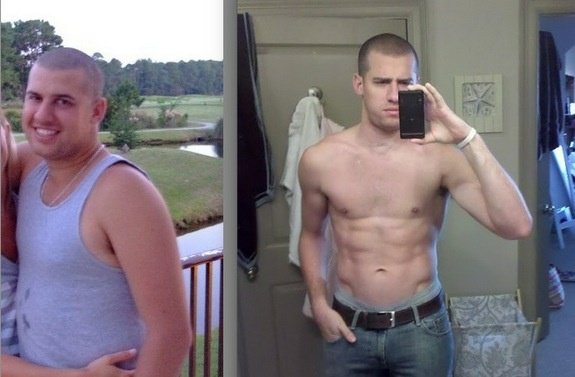
Alrighty! Let’s say you’re interested in dropping your body fat percentage, like my childhood friend Saint above.
Staci here also followed the principles of Nerd Fitness to get her results and significantly reduce her body fat percentage: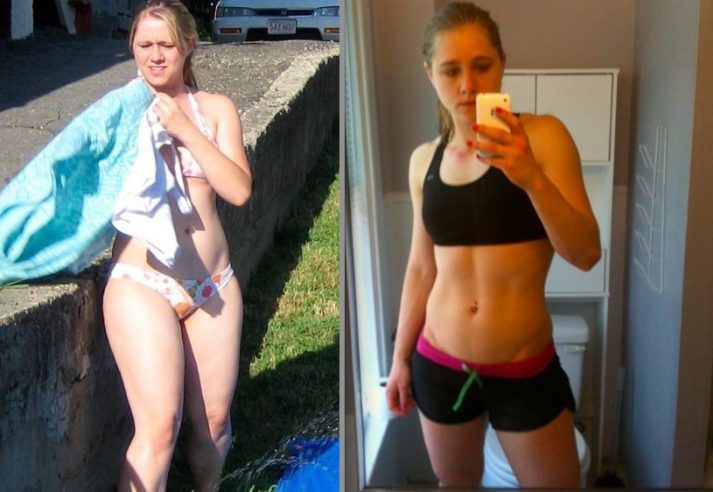
I’m sliiiiiightly biased, but both Saint and Staci, along with 35,000+ other students, reduced their body fat percentage by following the methods we teach all clients in our 1-on-1 Online Coaching Program.
As you’ll read below, the biggest piece of the puzzle to getting to a low body fat percentage is having the right nutritional strategy of consistent caloric restriction, the right mental attitude, a supportive network of people to help you, and a plan to follow.
We know how tough it can be to change your diet. If you’re not sure what to eat, or you’re sick of trying a diet only to give up a few weeks later, I got you covered.
It’s something I’m really proud of, and I know it’s helped a lot of people: our 10-level Nerd Fitness Diet Cheat Sheet. Pick the level you’re comfortable with, stick with it for at least 2 weeks, and then level up when ready and follow the next level! Simple.
Grab your cheat sheet free, along with 4 other free guides, when you sign up in the box below – I’m confident it can help you reduce your body fat percentage permanently.
I can’t teach you everything in a quick article, though I can absolutely give you some overall tips and tricks below to get you started.
Here are the Nerd Fitness methods we recommend to get down to a lower body fat percentage.
Note: these are JUST suggestions, your results may vary!
If you only want to drop a few percentage points (to a healthier weight), you can start with the advice at the top, and work your way down towards the bottom as you get lower and lower – the closer you get to single digits (dudes) or low double digits (ladies), the more strict you need to be with your diet and training.
1. Eat a caloric deficit – Although I believe there is more to it than just this, in order to lose weight, you need to be eating a caloric deficit – burning more calories than you consume consistently. If you are not strength training while eating a caloric deficit, you will most likely be losing muscle along with fat, which is not optimal but will help you lose body fat. Do this consistently and you’ll start to lose body fat.
2. Lift heavy things and move frequently – When you strength train with heavy objects (or with intense bodyweight training), you get stronger and keep the muscle mass that you already have. And yes, you can build muscle and burn fat at the same time. On top of that, you also push your metabolism into an “afterburner” effect which burns extra calories even after you are done working out.
3. Incorporate sprints into your off days – When you run sprints, you create a similar afterburner effect with strength training, meaning extra calories burned after the completion of your workout.
4. Consume enough protein, experiment with lower carb or lower fat – Set your caloric intake to be low enough that your body must pull from fat stores to fuel itself, resulting in fat loss. I’d recommend consuming enough protein to keep your muscles growing and rebuilding, while determining what’s best for your body to make up the rest of your calories each day: many people work better on a low carb diet. Others (like myself) can lose weight faster on a low-fat diet. Your results may vary. Read up more on the Keto Diet, the Paleo Diet, the Carnivore Diet, and the Mediterranean Diet for popular strategies.
And no, don’t do the Military Diet.
5. Work out in a fasted state, consider intermittent fasting – Although advanced techniques to get to super low body fat percentages are beyond the scope of this article, here’s another tactic if you want to drop the last few percentage points: strength train in a fasted state, and don’t consume your first meal of the day until AFTER your workout. Added bonus: by skipping a meal occasionally, you’re more likely than not to end up in a caloric deficit compared to when you were eating 6 meals per day.
I’ve been training in a fasted state for 5 years with zero issues on energy, but your results will vary.
6. Not losing weight? You’re eating too much! Get more accurate with your tracking. Consider a cheap food scale to make sure you’re actually eating the number of calories each day you think you’re eating. Example: I eat 1 serving of oats each day. If you look at a container of oats, it says “1 serving = 1/2 cup, or 40 grams.” I then put half a cup of oats on a food scale, and it weighed 60 grams. This means that every day, I was eating 1.5 servings of oats, not 1 serving. By weighing my food, I got my calories dialed in, and managed to lose about 15 pounds over the past 6 months, dropping my body fat down to 8%, while also hitting a deadlift PR.
Along with the above, keep reading Nerd Fitness articles, join our community, and start to implement the philosophies here and you’ll be on the right track.
The important thing to remember: this is NOT an overnight process. The best thing you can do is start treating yourself like a science experiment. Implement the suggestions above, track your bodyfat and see how it changes, and then course-correct and adjust based on results!
And another big thing to remember:
TEMPORARY CHANGES GET TEMPORARY RESULTS.
If you starve yourself to get shredded but then rebound aggressively by eating buckets of ice cream when you’re “done,” say goodbye to those abs!
Instead, our advice would be to find a nutritional strategy that works for you, a workout you enjoy, that you can see yourself sticking with permanently, that gets you at a body fat percentage you can maintain without being miserable.
Want someone to help guide you through this process? We got you! After all, there’s nothing more frustrating than putting in the effort and not seeing results.
Our Online Coaching Program partners you with a trained professional who will be with you every step of the way. You’ll work together and establish goals based on your life and experience, and then they’ll adjust your workouts along the way to make sure your results stick.
Click on the below image to learn more:
Also, here’s a video of a wombat. Because, wombats:
Is BMI the same as body fat percentage?
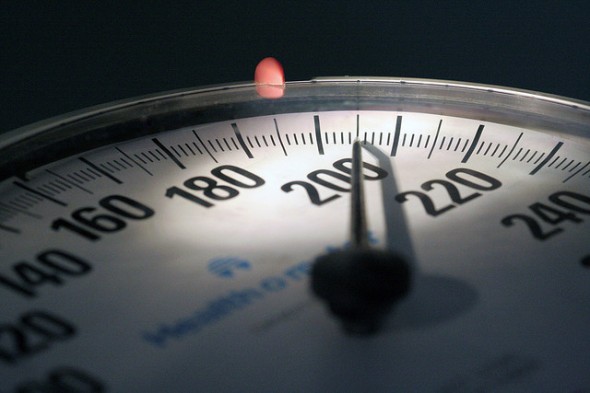
When you go to a doctor, they will most likely ONLY calculate your Body Mass Index (BMI).
Body Mass Index looks at your height and your weigh; based off this ratio, it tells you whether you are underweight, normal, overweight, or obese.
Seems pretty straightforward right? Obviously, as your weight increases disproportionately compared to your height, you are more likely to be overweight.
Notice I just said “more likely.”
Here’s why: Your BMI isn’t directly correlated to your body fat percentage – it only factors in your height and weight. It will give you the same reading if you’re made of 180 pounds of pure muscle, or 180 pounds of pure Cheetos.
For example, if I was six feet tall and 185 pounds with a body fat percentage of 10%, I would be put in the same “overweight” category as a guy who was six feet tall, 185 pounds, and a body fat percentage of 25%.
If two women have the same amount of body fat, and one tends to carry more water weight or have bigger bones than the other, one woman could be considered “overweight” while the other might be “average.”
For example: LeBron James is considered borderline obese when measured on the BMI scale, at a height of 6’8″ and 250 pounds. Of course, unless you look like LeBron James, or you can see your abs, disregarding BMI is missing the point.
I do believe BMI can be helpful if you are above 20% body fat (men) or 25% (women). Both your BMI and your body fat percentage would tell you that weight loss should be your primary goal.
HOWEVER, as soon as you start to get serious about your body weight and training and drop down to flat stomach levels of body fat percentage, then BMI becomes less of an accurate indicator of health.
You’ve unlocked the final reward: “the hedgehog boat”:
What other questions do you have on body fat percentage?
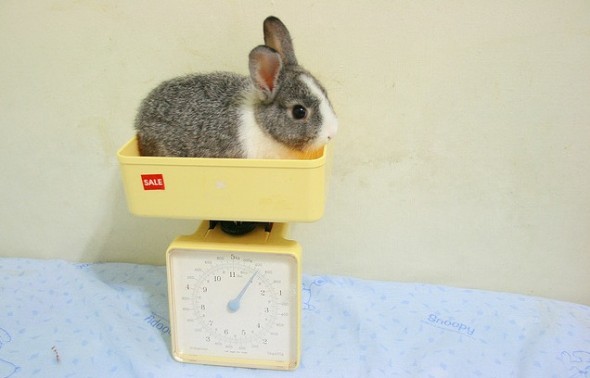
And that concludes today’s lesson on body fat percentage, friend!
I do most of my work in coffee shops these days, so I hope you understand the amount of work and the ridiculous number of embarrassing Google searches that had to happen in order to bring this post together.
Now, I know this is one of those super complicated topics, so I’d love to help any other way than I can.
[NF_Form id="14"]
If you are fired up and want to start reducing your body fat percentage in a healthy, sustainable way, consider trying our 10 Level Nerd Fitness Diet – we’ll send you a cheat sheet telling you exactly how to change your diet each week so you don’t get overwhelmed!
Grab your NF Diet sheet along with four guides to help you reduce your body fat percentage when you sign up in the box below:
- Follow our 10-level nutrition system at your own pace
- What you need to know about weight loss and healthy eating
- 3 Simple rules we follow every day to stay on target
We’ve helped tens of thousands of people transform into real life superheroes.
Either way, continue to poke around Nerd Fitness – all of our content is focused on helping you get results in a fun, non-condescending, supportive, and (most importantly) effective way.
Also, if you’re willing to put in the time, you WILL get the results you’re after.
Okay, time to watch more cute animal videos 🙂
-Steve
PS: If you are somebody that wants to know they are following a program that is tailor-made for their life and situation and goals, check out our popular 1-on-1 Coaching program. You’ll work with our certified NF instructors who will get to know you better than you know yourself, and program your nutrition and workouts for you.
###
photo sources: tape measure and caliper, tape measure, weight scale, bunny in scale
from Nerd Fitness http://bit.ly/2oLRPYL


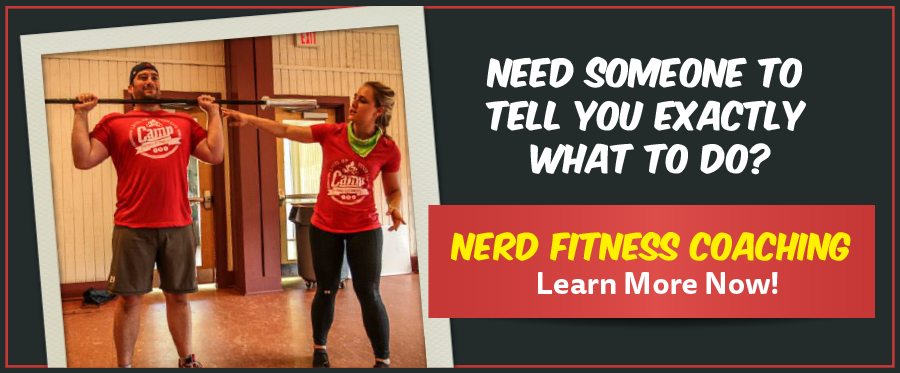
0 comments:
Post a Comment